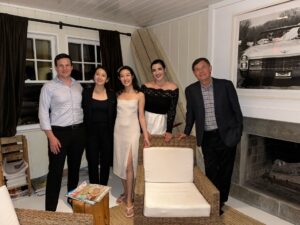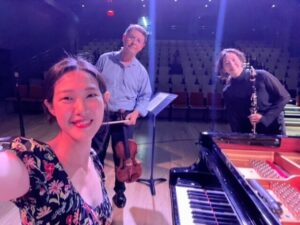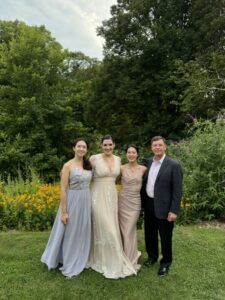Curtis in Nantucket and East Coast Tour

 Curtis on Tour, the Nina von Maltzahn global touring initiative of Curtis, recently wrapped up another successful festival in Nantucket, with performances at St. Paul’s Church, the Great Hall, and Siasconset Casino, July 16–18, as part of its annual week of classical music on the island. Renowned alumni soprano Sophia Hunt (Voice ’22), clarinetist Sara Han (’22), pianist Ying Li (’19 and CAF ’22), and Curtis President and violist Roberto Díaz (’84) performed audience favorites–from Schubert’s beloved song “The Shepherd on the Rock” and a breathtaking aria from Wolfgang Amadeus Mozart’s lesser known opera Il re pastore to pieces by legendary Curtis alumni Leonard Bernstein (Conducting ’41), Samuel Barber (Composition ’34), and Nantucket’s own Ned Rorem (Composition ’44).
Curtis on Tour, the Nina von Maltzahn global touring initiative of Curtis, recently wrapped up another successful festival in Nantucket, with performances at St. Paul’s Church, the Great Hall, and Siasconset Casino, July 16–18, as part of its annual week of classical music on the island. Renowned alumni soprano Sophia Hunt (Voice ’22), clarinetist Sara Han (’22), pianist Ying Li (’19 and CAF ’22), and Curtis President and violist Roberto Díaz (’84) performed audience favorites–from Schubert’s beloved song “The Shepherd on the Rock” and a breathtaking aria from Wolfgang Amadeus Mozart’s lesser known opera Il re pastore to pieces by legendary Curtis alumni Leonard Bernstein (Conducting ’41), Samuel Barber (Composition ’34), and Nantucket’s own Ned Rorem (Composition ’44).
 Following the ensemble’s performances on the island, the artists traveled to Falmouth, Mass., for a performance at Highfield Hall on July 22, presented two concerts on July 23 and 24 at Buttenwieser Hall at the Arnhold Center in partnership with 92NY, and concluded its tour on July 25 at the First Presbyterian Church of East Hampton, New York, as part of Music for Montauk‘s 2024 season, led by artistic director Miloš Repický, the Hirsig Family Chair in Vocal Studies and principal opera coach at Curtis.
Following the ensemble’s performances on the island, the artists traveled to Falmouth, Mass., for a performance at Highfield Hall on July 22, presented two concerts on July 23 and 24 at Buttenwieser Hall at the Arnhold Center in partnership with 92NY, and concluded its tour on July 25 at the First Presbyterian Church of East Hampton, New York, as part of Music for Montauk‘s 2024 season, led by artistic director Miloš Repický, the Hirsig Family Chair in Vocal Studies and principal opera coach at Curtis.

An embodiment of the school’s “learn by doing” philosophy, Curtis on Tour offers students real-world, professional touring experience alongside celebrated alumni and faculty. In addition to performances, musicians engage with local communities through educational and community engagement activities. For more than 15 years, Curtis on Tour has maintained a presence at top international concert halls, performing more than 450 concerts in over 120 cities, from New York to Berlin and Hong Kong to Santiago.
Visit Curtis.edu for more information about upcoming tours during Curtis’ 2024–25 season: Great to Groundbreaking, celebrating the school’s historic 100th anniversary.
Photos of Sophia Hunt, Sara Han, Ying Li, Roberto Díaz, and Andrew Lane (vice president, touring and artist management) courtesy of Ying Li.


